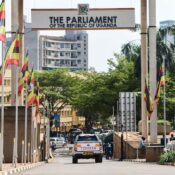
South Africa has no intention of retaliating against Trump’s tariffs
Senior government officials stated on Friday that South Africa will attempt to negotiate exemptions and quota agreements rather than react against the United States for the tariffs that President Donald Trump proposed this week.
When Trump announced a 10% baseline duty on all imports and higher targeted charges on dozens of countries on Wednesday, he put a 31% tariff on South African imports into the United States.
After China, South Africa’s second-largest bilateral commercial relationship is the United States.
The most developed country in Africa has already stated its desire to reach a bilateral trade agreement with Trump’s administration. However, given the U.S. president’s repeated attacks on South Africa since returning to the White House in January, that appears to be a difficult task.
According to Parks Tau, the commerce minister, South Africa’s average import tax was 7.6%. “To say we will impose reciprocal tariffs without first understanding how the U.S. arrived at 31%… would be counterproductive,” Tau said at a press conference.
Meanwhile, Ronald Lamola, the foreign affairs minister, claimed that Trump’s tariffs essentially wiped out the gains made by African nations under the African Growth and Opportunity Act.
The AGOA program, which allows duty-free access to the U.S. market for certain African countries, is set to expire in September. Furthermore, Trump’s extensive tariffs imply that it is now doubtful that the 2000 trade agreement would be renewed.
The ministers stated that the United States’ actions highlighted the necessity for South Africa to step up its attempts to diversify its export markets, citing the Middle East and Asia as possible destinations.
They stated that the government would work to assist the sectors most impacted by the tariffs in the meantime, such as metals, processed foods, agriculture, and auto production.
Tau stated that the government will not take away the advantages that American automakers receive from its Automotive Production Development Program, which is a production incentive program.
Losing its AGOA status might slow economic development by less than 0.1 percentage points, according to South Africa’s National Treasury.
Depending on the degree of trade obstacles and the degree to which financial market sentiment is impacted, the central bank has modeled a number of scenarios pertaining to South Africa’s access to U.S. markets. The consequences range from less than 0.1 percentage points to 0.7 percentage points.
The 25% tariff on all automobiles and auto parts imported into the United States is in addition to Trump’s most recent levies. South Africa, which exports more than $2 billion worth of automobiles and car components to the United States annually, is especially at risk from that.
All Categories
Recent Posts
Tags
+13162306000
zoneyetu@yahoo.com



